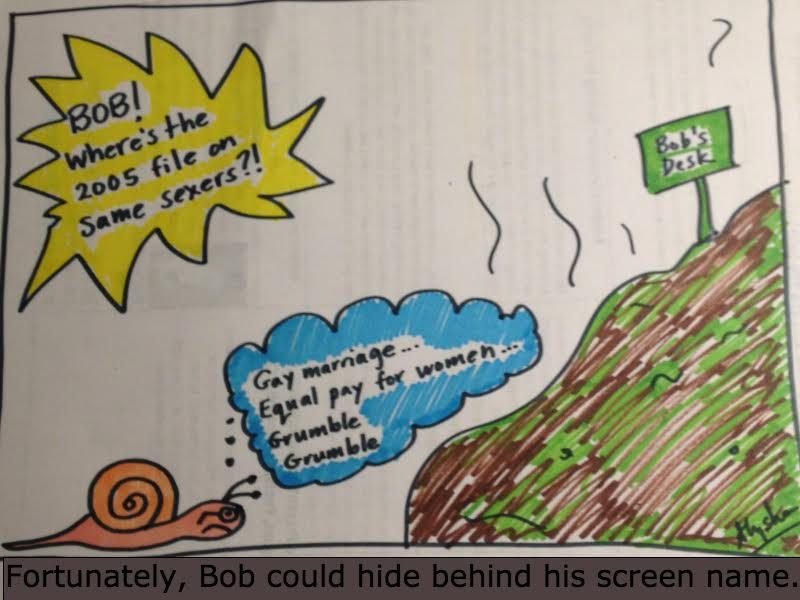There are still some scenarios where same-sex Canadians must adopt their own children.
Despite all the advances Canada has made for same sex couples, apparently there are still some scenarios where same-sex Canadians must adopt their own children.
As a mother of two, with a wife of ten years, in Ontario when I saw “Same-sex couples push for parental equality in Ontario” (The Canadian Press, October 4, 2015) on Canada’s most reliable main media, Facebook—I mean, CBC (Canadian Broadcasting Corporation), I nearly choked on a pretzel.
My first reaction was annoyance: people have asked us whether Vicky and I had to adopt our kids and we always felt slightly harmed by the question; we’re married: we’re just like other married couples.
And it is true, each of our children’s birth certificates held a spot for two parents, “mother” and “other parent.” (Thanks to the case slightly referred to within the article.)
Yet the headline makes you feel otherwise. After reading the whole article (multiple times) I realized this actually deserves a “Thank You” to the CBC: in its vague discussion of the current situation, the article tries to engender support towards the new bill proposed in order to end the inanity; despite the 10 years since same sex marriage has been legalized in Canada simple paperwork has still not been updated.
And then my second reaction registered: “Oh shit.”
We assumed the laws of marriage protected us, but this article’s stories suggest that had Vicky or I died in childbirth, “the system” might add to our family’s trauma by not permitting the surviving parent to leave the hospital with our newborn.
What human would ever know these minor details, and be audacious enough to impose such fine print, you ask? Surely your doctors at the hospital would vouch for your family structure? (Not that you or I would want the risk of falling victim in such a nasty and heartbreaking scenario.)
Regardless, just when I was doubtful over such a horrible person’s existence: I read the comments at the end of the article.
To steal a line from poor Captain Kurtz: The Horror. Who are these people and under what rock do they hide ruminating about the destruction gay people will bring to the earth?
I was contemplating this question and came across another reliable source of Canadian news: The Rick Mercer Report (also a CBC production).
While Mercer is known for his spoof headlines, his rant on Jan 19 2016 was fixated on the same group of anonymous online commenters who went so far as to turn their opinion of Mercer’s friend (mentioned in a news article) into a death threat.
If you want to say something, do so with your Facebook, Google +–or even better, your Linked In account. (Let’s make a paper trail to see if those bigots ever get a job again!)
But we have to be careful: it sounds a lot like censorship, which nobody really loves.
In the history of written media, commenters have been encouraged to hide behind their cover name. Privacy is important to eliciting candid opinions to fuel public debate. Certainly keen journalists like Clark Kent would never have gotten as many shots of Superman if a journalist’s code didn’t allow him to protect his sources.
Yet in print media, there is an editor monitoring the submitted comments and only printing the best, most articulate minds. Given the ease and speed with which people submit comments online, if newspapers delay comments, they lose their audience’s attention.
CBC’s online submission guidelines, say before you submit content you should “Be respectful and courteous, as if you were having a face-to-face discussion.”
Yet the problem is, these people aren’t, and they won’t, unless there is some way that they can’t. It’s another extension of Jeremy Benthom’s Panopticon Theory: the fear of being watched makes you behave more correctly.
It would seem to me in an age where whole communities, children, parents, schools, friends, governments have been racked with grief and feel incredibly helpless against the ubiquity of cyberbullying amongst our youth—by enabling anonymous online comments, we are modelling a hypocritical message of, “don’t bully people you know, but for those you don’t: have at it.”
So I say, good on you, Mercer.
If you have something to say, say it with your real name, to my real face.
Watch Rick Mercer's Rant below
About the Author:
Alysha Dominico is a Canadian lesbian mompreneur. Find out more about her work at alyshadominico.com
Connect with Alsyha on Twitter @alyshadominico
